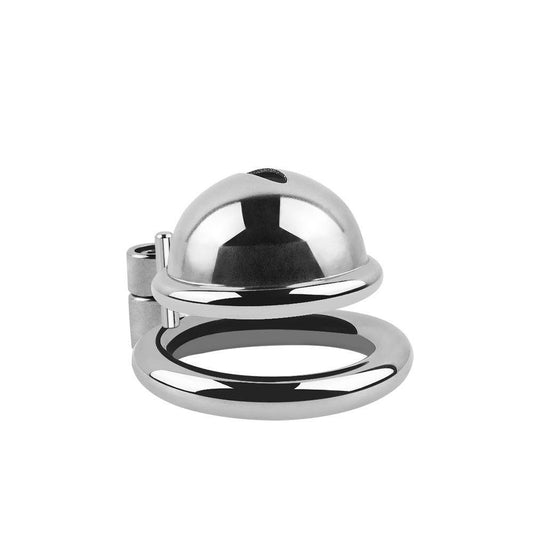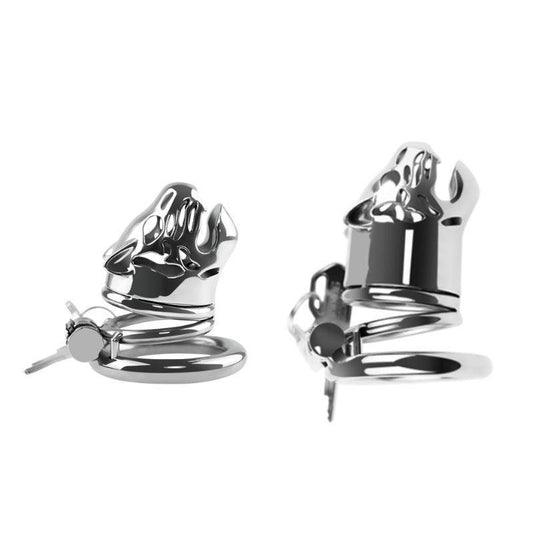Choosing the right size of a chastity cage requires more than just taking a few measurements. To ensure safety and comfort while achieving the desired effects, it’s essential to understand the physiological aspects of the body and how it responds to prolonged wear. In this article, we’ll explore how medical and physiological knowledge can help you find the perfect fit.
The Importance of Proper Sizing

A chastity cage that doesn’t fit properly can cause physical discomfort, medical complications, or failure to achieve its intended purpose. Correct sizing ensures that the cage functions safely and accommodates natural physiological changes in the body.
1. Understanding Male Physiology

Before diving into measurements, it’s helpful to understand how the male body responds to various conditions that can impact the fit of a chastity cage.
A. Fluctuations in Penis Size
- Temperature: The penis shrinks in cold environments and expands in warm ones due to blood flow changes. Measuring in neutral conditions is essential for accuracy.
- Blood Flow and Erection Response: Even in a flaccid state, blood flow can increase due to arousal or random nocturnal erections, causing temporary swelling that a cage must safely accommodate.
B. Scrotal Anatomy
The scrotum and the base of the penis also play a critical role in fit. Tight base rings can restrict blood flow, while loose ones can lead to slippage. Understanding your body's natural movements helps in choosing the correct size.
2. Measuring for Safety and Comfort

Accurate measurements reduce the risk of complications like impaired circulation or tissue damage. Follow these steps:
A. Length
- Measure the flaccid length of your penis from the base (near the pubic bone) to the tip of the glans using a flexible ruler.
- Subtract 1/4 inch (6–7 mm) from your measurement to allow for snug but safe compression.
B. Diameter (or Girth)
- Measure the circumference of your penis while flaccid using a measuring tape or string.
- Divide the circumference by π (approximately 3.14) to get the diameter.
- The cage diameter should match your calculated size to prevent slipping or excessive constriction.
C. Base Ring
- Measure around the base of your penis and scrotum when relaxed.
- Select a ring that fits snugly without pinching or restricting movement. A common guideline is to use a size where one finger can comfortably slide under the ring.
3. Physiological Safety Considerations

A well-sized chastity cage should respect the body's physiological needs and avoid causing harm.
A. Circulation and Blood Flow
- A cage that is too tight can compress veins and restrict blood flow, leading to numbness, discoloration, or swelling.
- Warning signs of poor circulation include bluish skin, persistent tingling, or cold sensations. Remove the cage immediately if these occur.
B. Skin Health
The genital area is sensitive and prone to chafing or irritation. Tight cages can cause abrasions, while loose cages may cause friction burns.
- Choose materials like medical-grade silicone or stainless steel that minimize irritation.
- Ensure the cage has smooth edges and proper ventilation to avoid moisture buildup and bacterial infections.
C. Erections and Nighttime Swelling
Nocturnal erections are a natural part of male physiology. The cage should allow for minimal expansion to prevent discomfort or pressure on the tissues. A slightly smaller cage lengthwise can help mitigate this, as it discourages full erections without causing pain.
4. Adapting for Long-Term Wear

For those intending to wear a chastity cage over extended periods, physiological adaptability is crucial.
A. Adjusting to Restriction
The body may take time to adjust to wearing a cage. Initially, you might experience mild swelling or discomfort as your skin and tissues adapt. Gradual acclimatization is key.
B. Hygiene and Maintenance
Ensure the cage design allows for easy cleaning to prevent infections. Regular removal for cleaning is vital, especially for longer wear durations.
C. Psychological Feedback
Physiology and psychology are intertwined. If the cage feels excessively uncomfortable, it can lead to heightened stress responses, which can increase muscle tension and exacerbate discomfort.
5. Tips for Beginners

- Start with Adjustable Options: Many cages come with interchangeable rings and spacers, allowing you to experiment and find the perfect fit.
- Monitor for Red Flags: Regularly check for signs of poor circulation, skin irritation, or excessive pressure.
- Experiment Gradually: Begin with short wear times and gradually extend duration to allow your body to adapt.
Conclusion

Choosing the right size chastity cage requires an understanding of both your body's physiological needs and its natural responses. By taking accurate measurements, respecting the body's limitations, and starting cautiously, you can enjoy a safe and comfortable experience. Remember, the goal is to strike a balance between restriction and safety—your body will thank you for the care you take in this process.









